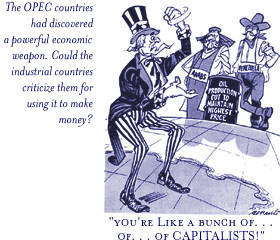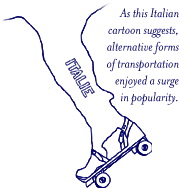Money
Matters: An IMF Exhibit -- The Importance of Global Cooperation
|
Reinventing
the System (1972-1981)
|
Part
2 of 7
|
|
|
|
| |
OPEC
Takes Center Stage
|
| <--Previous
|
Next--> |
| |
|
The
fourth Arab-Israeli conflict broke out in October 1973. Over the
next three months, the price of crude oil shot up 300%! Global energy
and financial crises ensued.
|

credits |
Did
the war cause the oil crisis? The answer is yes, and no:
- Because
of the war, the Organization of Arab Petroleum Exporting Countries
(OAPEC) declared an oil embargo
against the United States and the Netherlands - countries judged
too friendly to Israel. The embargo caused severe energy shortages
over the winter of 1973-74.
- At
the same time, the Organization of Petroleum Exporting Countries
(OPEC) sharply raised the price of crude oil. Although
OPEC acted mainly for economic reasons, the war did serve as a
catalyst. (OPEC includes the OAPEC countries, plus other non-Arab
oil exporters such as Indonesia, Ecuador, and Venezuela.)
|
|
Ultimately, it was the steep oil-price increases of the 1970s, not
the politically motivated 1973 embargo that intensified high inflation,
caused a global recession, and drastically altered most countries'
balance of payments.
|
| |

credits
|
OPEC's
Point of View
- The
U.S. dollars OPEC received
for oil fell in value during the early 1970s, because of devaluations
and depreciation.
- Oil
prices had not kept up with other commodities. Between 1960 and
1973, the price of oil increased a mere 25% - far less than other
commodities.
- Underpricing
had caused oil to be wasted. OPEC price increases and production
cuts were necessary, to protect resources from depletion.
|
Dealing
with the Energy Crisis
|
- In
December 1973, a large part of the British work force began to
work a three-day week to conserve electricity.
- In
the United States, year-round daylight saving time went into effect
in 1974, and the national speed limit was lowered to 55.
- In
Europe, stores could not keep up with a high demand for bicycles.
- India's
prime minister, Indira Gandhi, set an example in November 1973
by riding to and from work in a horse-drawn cart.
- The
oil embargo caused serious gasoline shortages in the winter of
1973-74.
|
| |
|
|
|
| <--Previous
|
Next--> |